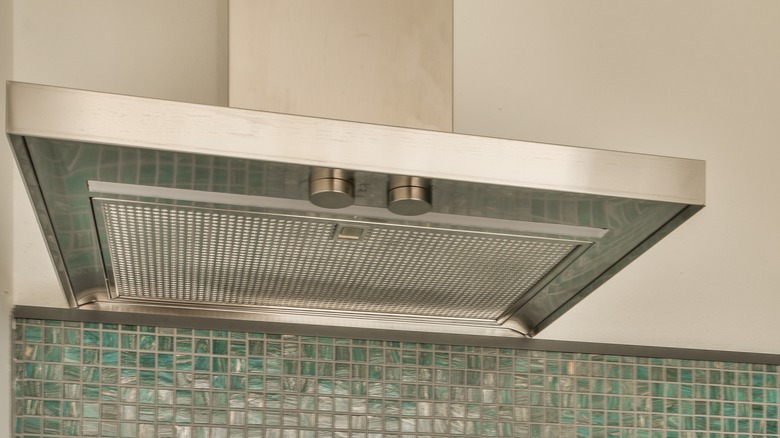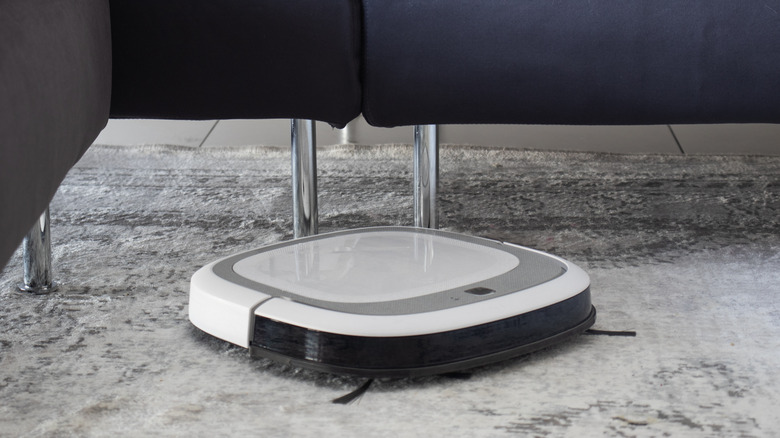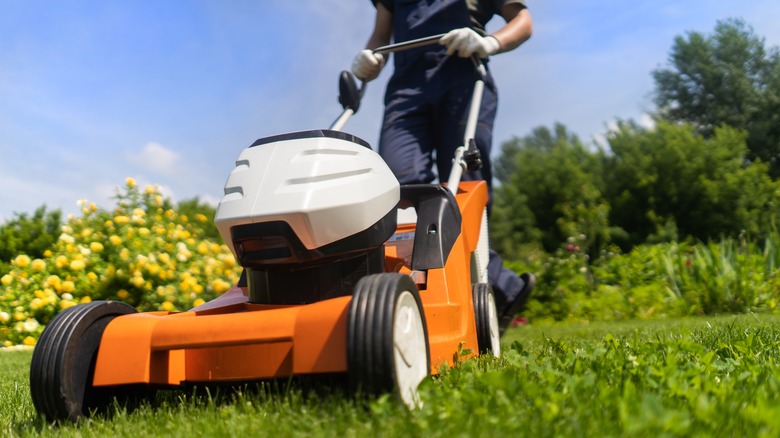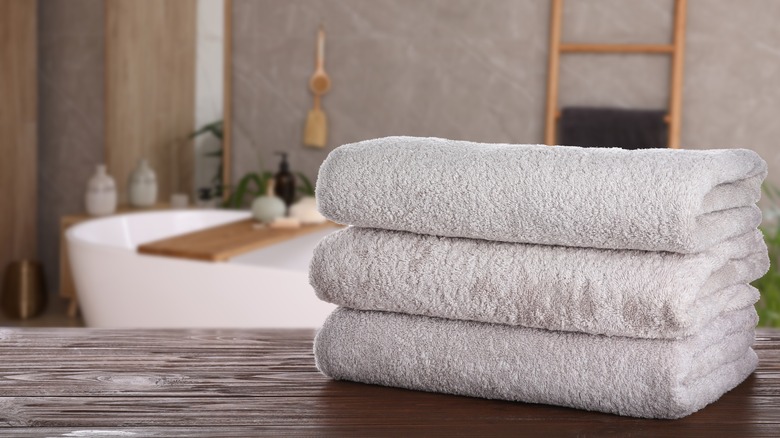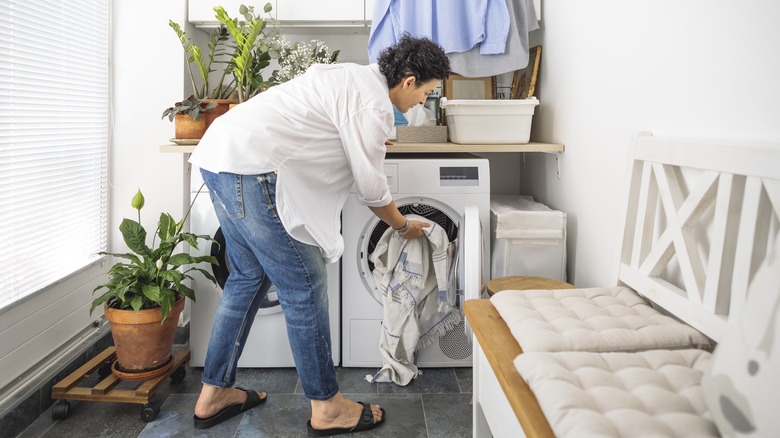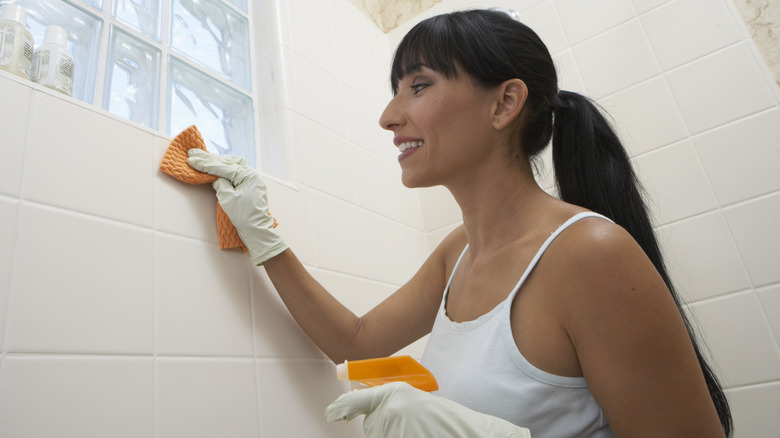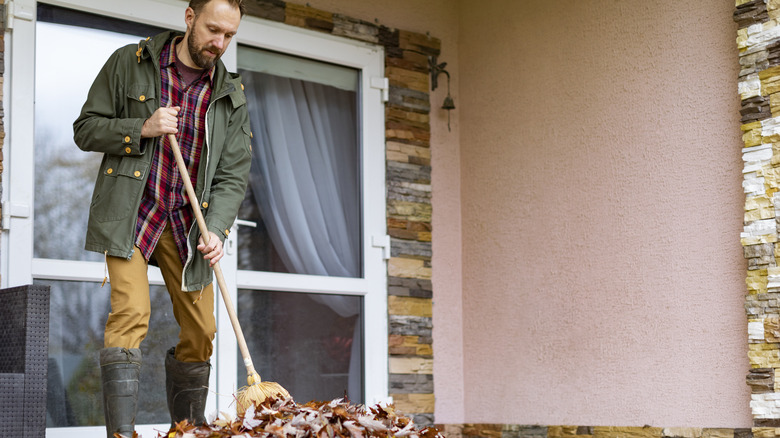14 Household Tasks You Should Be Doing Weekly To Keep Things Running Smoothly
We may receive a commission on purchases made from links.
Most of us aren't fans of chores — however, there are a few things you can do around the house each week to keep things running smoothly. Most of the time, the longer you leave something, the harder it becomes because the mess just keeps accumulating. By doing a little bit of work more often, you are more likely to stay on top of even the most tedious chores.
For example, by vacuuming your home each week, you can greatly reduce the crumby sensation of having cracker dust stuck to your feet. Swapping out your sheets and towels weekly can save you from millions of deadly bacteria. Even still, the mammoth task of cleaning out your fridge becomes less mammoth when you do it more often. Each chore becomes less painful the more often you do it, and these are the ones that should be at the top of your weekly list.
1. Declutter your kitchen table (or entryway dumping ground)
Every house has one: The "stuff spot." Whether it's a chair in your hallway, your kitchen table, or even a bowl on your dresser — there is one spot where you just dump everything as the week goes on. This could be everything from receipts for recent meals, bills to pay, RSVPs to send back to friends — even kids' lunchboxes and soccer uniforms to return. Whatever the contents, if you don't take care of it once a week, it will just continue to build, making the task more overwhelming.
Having a "stuff spot" is a pretty great start to being organized, as at least with this dumping ground everything is already in one place. The key is not to let yourself get too behind. Take a moment to unload the lunchboxes, place the shopping returns in the car, and enter your receipts into Splitwise so your housemates pay you back for once.
2. Clean your stove's range hood
We know what you're thinking, "no way does this need to be a weekly chore!" But hear us out: Every task you take two minutes to do weekly will save you hours' worth of elbow grease in the future. Each time you cook, grease and grime build up on the underside of your stove's range hood. For the most passionate of cooks, there might even be splatter on the outsides of the metal, too.
Clean your kitchen range hood by giving it a quick wipe down once a week to ensure your kitchen looks cleaner overall and keep any long-term issues from developing. This could be things like rust or corrosion in the fan, staining on the hood, or bad smells in general. Typically a quick wipe-off with warm water will do the trick. However, if anything is stuck, try using a toothbrush with firmer bristles to knock it loose.
3. Vacuum your floors
While you should be vacuuming every few days (especially if you have pets that shed), doing so at least once a week will help keep your house running smoothly. This way, your more constant attention will keep pet hair, grime, crumbs, and dirt from building up and making the chore take longer than it needs to. Ideally, a weekly vacuum would allow you to not need to empty the canister mid-chore. If you just can't stomach doing it so often or having crumbs on your feet in between runs bothers you, a Roomba is a great investment. If that is out of budget, retailers like Amazon sell off-brand automatic vacuums for a much lower price.
If you would like to add mopping to the mix, the best way to do it depends on the type of flooring. While tiling does well with a classic mop and bucket and as much water as you might like, you should be more careful with wooden floors. To keep them in the best condition, take most of the water out of the mop, or use a dryer option like a Swiffer, as a sopping wet tool can damage the planks.
4. Water your plants
Watering your houseplants about once a week is ideal. The key is to give your garden a deep drink less often, rather than small sips every day. The roots of most indoor plants need time to absorb moisture before the soil dries out. Watering weekly allows this to happen, which prevents the waterlogged conditions that can lead to root rot, wilting, and the premature death of your favorite succulents and flowers.
To keep yourself from doubling up, it's best to designate one day a week as water day and stick to it. This might be a weeknight so you are more likely to be home rather than out running errands or hanging with friends. Whatever day you choose, remember that you should water your plants either first thing in the morning, or after the sun has started to set. This isn't because the sun will burn the plants, as that is a myth, but rather that watering outside the heat of the day will keep the water from evaporating before it can be properly absorbed.
5. Mow and edge your lawn
Mowing the lawn — you either love or hate it. But, letting it grow too long only makes it more difficult to mow later, and could get you in trouble with your HOA, if you have one. As lawn care expert Chris Bonnett told Tom's Guide "During the summer months, try and keep your lawn at a consistent height and mow as needed. It's tricky to say how frequent that should be — but weekly or fortnightly is about right. Regular mowing will keep your lawn looking good and will keep weeds at bay."
However, this level of frequency is just during the warmer months. As the UK's National Greenhouse director, Ian Grany adds that from "March to September your lawn should be mowed every seven to ten days. If you are watering and fertilizing your lawn during the summer months you can even mow every three days." Outside of these times, you can mow and edge less frequently, as your grass won't be growing as quickly. No matter how often you mow, however, to keep things running smoothly you should never cut your grass too short. The perfect height is about 2 ½ to 3 ½ inches from the soil as anything less could kill the grass.
6. Do a little dusting
Dust builds up quickly, so doing a weekly dusting is essential to keeping your home clean and running smoothly. One of the easiest ways to keep dust under control is by using a Swiffer. They are made to attract and trap dust, so you can easily wipe it away without sending it flying into the air. Just give everything a good Swiffer once a week to quickly get rid of dust on your furniture, shelves, and other surfaces around the house.
While giving your space a quick Swiffer dusting once a week is a good way to keep things looking neat, it's also a good idea to do a more thorough dusting session once a month. Try wet dusting with a damp cloth or microfiber towel to tackle that built-up dust and dirt. This method is great for getting into all the nooks and crannies where dust likes to hide. This can help prevent dust from getting out of control and causing respiratory issues or other health problems.
7. Swap out your towels
Since we dry off our clean hands and bodies with towels, it might not occur to you that these linens can easily become filthy. However, towels both in the bathroom and kitchen should be changed at least once a week so you aren't reexposing yourself to bacteria. Studies show that kitchen towels play a vital role in cross-contamination. When we wipe our hands, wipe the counters, and clean up spills with the same cloth, the germs cling to it and spread — easily making us sick.
To avoid this, try having designated towels in the kitchen for different tasks, so raw chicken juice doesn't get smeared across everything when you are cleaning later. Even so, changing these towels at least once a week will also go a long way toward keeping you safe and healthy. In the bathroom, it's much the same. Swap out your body and face towels weekly and always let them air dry completely between uses, less mold and mildew form.
8. Change your bed linens
It's the chore we all love to ignore: Changing our bed linens. It happens to the best of us. We strip the bed in the morning, forget to put the wet sheets in the dryer or come home from a long day at work only to realize we can't crawl right into bed because we still have to make it. However, as frustrating as it might be, changing your bedsheets each week can be good for your health.
While sleeping, we shed skin cells that build up on our sheets over time. Sweat also seeps into our bedding. To keep yourself safe and healthy, swap your sheets once a week. If you struggle with the aforementioned laundry problem, invest in a second set of sheets so you can redress your bed before the load is even finished. If you really can't stand it, change them every two weeks at the most.
9. Do your laundry
Laundry is a chore that can so easily get out of hand if you let it. This is because it's never truly finished. However, there is a way to get ahead of the piles of clothes and keep things running smoothly at home: Only do your laundry once a week. Even better is if you can do your laundry on the same day each week. Doing the chore this way avoids two of the most common pitfalls of laundry-avoiders. The first being "There is way too much laundry how will I ever get it done" and the second being "There is so much laundry to do I need to drop everything and do it right now." Neither of these mindsets is productive for actual productivity.
Instead, select one night a week as laundry night. Get through as much of it as you can in that time. If it makes things easier for you, we find it easier to "pre-sort" our laundry. Instead of throwing everything into one hamper, purchase three or four inexpensive ones and line them up in the laundry room. One for whites, one for delicates, colors, etc. This is especially helpful if you are doing laundry for your entire household, as pre-sorting can save lots of time when loading the machine.
10. Clean your bathrooms
The bathroom is another one of the areas in the house that the longer you go in between cleans, the harder it will be for you. To keep things running smoothly, clean your bathroom at least once a week so the ick factor doesn't build up. The main things to clean are things that could be a bit of a biohazard. For example, cleaning the toilet bowl, seat, and handle with chemicals strong enough to kill bacteria and erase smells. Next, give your shower a spray and wipe off the mildew before it can go further and start to stain your grout and shower curtain.
Do the same with your sinks and countertops. Be sure to move countertop items like soap dishes, makeup, and medications to clean underneath them. Finish off by doing a quick vacuum and mop of the tile flooring and removing all trash from the room. By taking 10-15 minutes once a week to clean your bathroom, it should never get too gross.
11. Do a quick tidy-up in your kitchen
Keeping your kitchen clean is not just about keeping things looking nice. It's about maintaining a healthy and functional space for cooking and dining. While a quick tidy-up each night after dinner might seem like enough, you should spend a little longer doing deeper cleaning at least once a week. Germs, mold, and other contaminants can grow in dirty places, which can make you sick if you eat food they've touched. Keeping your kitchen clean every week helps to prevent this, so you can be sure your food is safe to eat. Plus, when you leave spills, crumbs, and grease lying around, you're inviting ants, cockroaches, and rodents into the space. Not only do these pests contaminate your food, but they can also bring some nasty diseases and allergens into your home.
To start, keep countertops sanitized by wiping them down with a fresh cloth and strong disinfectant. Brands like Clorox, Dettol, and Ajax contain the chemicals needed to kill germs. Take the time to scrub built-up food from your microwave and stovetop, as the longer the grim sits, the harder it is to get off. Next, run your dishwasher — or clean your dishes by hand. If you have a drying rack, clean the drip space underneath it as it's a prime spot for mildew to grow.
12. Take out the trash
Most of us take the main kitchen trash out more than once a week (unless you live in a sharehouse and are currently in a standoff over whose turn it is), but don't forget the rest of the rooms in your house, too. You should be gathering the trash from your office, bedroom, and bathroom to remove weekly, too. Waste, whether it's food scraps from late-night snacking, used feminine hygiene products, or other disposables, should be removed from your house before it has the chance to begin rotting or badly smell.
An easy way to remember to gather the trash is to set a reminder for the night before trash day. Whether it's on your phone, physical calendar, or even on Alexa — a quick note to take five minutes gathering the trash (and recycling!) from around your house will save you from the scramble when you hear the collection truck in the morning. Plus, if you miss trash day, you are likely stuck surrounded by rubbish for the next week, definitely not a fun situation to be in.
13. Check your fridge
You should clear out your fridge at least once a week. Most folks put this off because it can be kind of a gross task, but by procrastinating, you are just making it worse for yourself. Luckily, we don't mean a full clean-out. While you should take the shelves out and wash them in warm soapy water every once in a while, weekly — the only thing you need to do is check the food inside.
Although a popular saying, it is true that one bad apple ruins the whole bunch. So once a week, take a look through your produce drawers. Is the fruit you bought because you wanted to start making smoothie bowls for breakfast still fresh? Or has the spinach you purchased started growing mold which is spreading to everything around it? Take a pass at your leftovers at least once a week, as well. In truth, bacteria begins to grow (even on refrigerated items) after three to four days, making most things unsafe to eat. So, if your takeaway or homemade dinner from a week ago is still in the fridge, it's time to toss it.
14. Sweep your outdoor areas
At least once a week, be sure to sweep up your outdoor areas. Whether you have a small front porch, a long walkway, or a massive deck, clearing them off more often will keep the task more manageable. Sweeping's main benefit is that there will be fewer things for your kids, pets, or housemates to track into the house. If you get the dirt and leaves away from the door, you won't have to worry about getting stains out of your carpet or feeling grit walking barefoot in the kitchen. Tidying up your outdoor areas can also enhance the general curb appeal of your home. Even if your property isn't on the market, removing piles of leaves, sticks, and other grime from view just makes everything look better.
For the best results, invest in an outside broom. Using a sweeper from inside outside will only invite more dust and grime into your home. Choose a broom that has stiff bristles, as brick or concrete might wear down softer too quickly, leading to constant replacement. Brush organic debris back to where it came from, not just back and forth as often shown on TV. For nonorganic clutter, sweep it into a pile so it's easier to dispose of.


